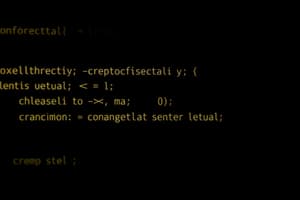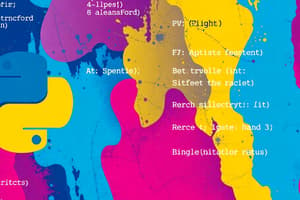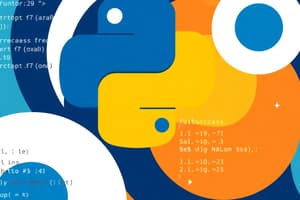Podcast
Questions and Answers
What is the main purpose of using functions in programming?
What is the main purpose of using functions in programming?
- To simplify program management by dividing tasks (correct)
- To convert all code into a single block
- To ensure that code runs without errors
- To make the program larger and more complex
Which of the following is NOT a component of a Python function?
Which of the following is NOT a component of a Python function?
- Arguments
- Statements
- Name of the function
- Return Instructions (correct)
What distinguishes built-in functions from user-defined functions in Python?
What distinguishes built-in functions from user-defined functions in Python?
- User-defined functions have fixed parameter types
- Built-in functions do not require user definitions (correct)
- Built-in functions must always return a value
- User-defined functions are less flexible than built-in ones
How can functions benefit the process of error detection?
How can functions benefit the process of error detection?
Which of the following best describes arguments in a Python function?
Which of the following best describes arguments in a Python function?
What type of user-defined function does not take parameters and does not return any values?
What type of user-defined function does not take parameters and does not return any values?
Which statement correctly describes a Type 2 user-defined function?
Which statement correctly describes a Type 2 user-defined function?
What keyword is used to begin the definition of a function in Python?
What keyword is used to begin the definition of a function in Python?
How do you call a user-defined function with parameters?
How do you call a user-defined function with parameters?
In the example provided, what does the function 'add3' return?
In the example provided, what does the function 'add3' return?
Flashcards
What is a function?
What is a function?
A function is a reusable block of code that performs a specific task. It helps organize a program by dividing it into smaller, manageable pieces.
Arguments in functions
Arguments in functions
Functions can accept input values called arguments. These arguments provide data for the function to work with.
Return values
Return values
Functions can return a result or output value back to the main program. This output is the result of the function's calculations or actions.
Built-in functions
Built-in functions
Signup and view all the flashcards
User-defined functions
User-defined functions
Signup and view all the flashcards
What is a user-defined function?
What is a user-defined function?
Signup and view all the flashcards
Type 1 Function
Type 1 Function
Signup and view all the flashcards
Type 2 Function
Type 2 Function
Signup and view all the flashcards
Type 3 Function
Type 3 Function
Signup and view all the flashcards
What is a string?
What is a string?
Signup and view all the flashcards
Study Notes
Python Functions
- Functions are reusable blocks of code performing specific tasks
- They help organize programs into manageable modules
- A program is divided into smaller modules, each with a specific task
- Functions can be called multiple times, saving time and effort
- Functions make programs more manageable, easier to debug, and more efficient
Components of a Python Function
- Function Name: A unique name related to the function's task
- Arguments: Inputs to the function (optional)
- Statements: Instructions within the function
- Return Value: Value returned by the function (optional)
Types of Python Functions
- Built-in Functions: Predefined functions (e.g.,
print(),input()) - User-defined Functions: Created by the user for specific program needs
Creating a Function
- Use the
defkeyword to define a function - Provide a descriptive name for the function
- Supply parameters (inputs) in parentheses
- Function body (code) follows the definition
Calling a Function
- After defining, call the function by its name and supply necessary parameters
- This executes the function's instructions
String Operators
+: String concatenation (joins strings)*: String replication (repeats a string)
String Built-in Functions
len(): Calculates the length of a stringlower(): Converts a string to lowercaseupper(): Converts a string to uppercasecapitalize(): Capitalizes the first letter of a string
Lists in Python
- Lists are containers storing collections of values
- Values can be of any type (integer, string, other objects)
- Items are accessed using an index (starting at 0)
- Elements can be accessed using positive or negative indexes
List Operations
append(): Adds an element to the end of a listextend(): Adds multiple elements from an iterable to a listdel list_name(start : stop : step): Removes a sublist (or whole list) from a list
Studying That Suits You
Use AI to generate personalized quizzes and flashcards to suit your learning preferences.




